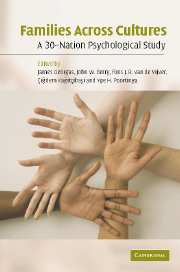Book contents
- Frontmatter
- Contents
- List of figures
- List of tables
- List of contributors
- Acknowledgments
- Prologue
- Part I
- Part II
- 9 The Algerian family: change and solidarity
- 10 Botswana
- 11 The Brazilian jeitinho: Brazil's sub-cultures, its diversity of social contexts, and its family structures
- 12 Britain
- 13 Bulgaria: socialism and open-market economy
- 14 Canada
- 15 Chile: new bottle, old wine
- 16 Cyprus
- 17 Portrait of family in France
- 18 Georgia
- 19 Germany: continuity and change
- 20 Ghana
- 21 Greece
- 22 Hong Kong, SAR China: transitions and return to the motherland
- 23 India
- 24 Indonesia: traditional family in a changing society
- 25 The Iranian family in a context of cultural diversity
- 26 Japan: tradition and change in the Japanese family
- 27 Mexico
- 28 Mongolia: traditions and family portrait
- 29 The Netherlands: tolerance and traditionalism
- 30 Nigeria
- 31 Pakistan: culture, community, and filial obligations in a Muslim society
- 32 The Saudi society: tradition and change
- 33 The South African family
- 34 South Korea
- 35 Spain: tradition and modernity in family structure and values
- 36 Turkey
- 37 Ukraine
- 38 Family in the United States: social context, structure, and roles
- Appendix
- References
- Index
30 - Nigeria
Published online by Cambridge University Press: 10 December 2009
- Frontmatter
- Contents
- List of figures
- List of tables
- List of contributors
- Acknowledgments
- Prologue
- Part I
- Part II
- 9 The Algerian family: change and solidarity
- 10 Botswana
- 11 The Brazilian jeitinho: Brazil's sub-cultures, its diversity of social contexts, and its family structures
- 12 Britain
- 13 Bulgaria: socialism and open-market economy
- 14 Canada
- 15 Chile: new bottle, old wine
- 16 Cyprus
- 17 Portrait of family in France
- 18 Georgia
- 19 Germany: continuity and change
- 20 Ghana
- 21 Greece
- 22 Hong Kong, SAR China: transitions and return to the motherland
- 23 India
- 24 Indonesia: traditional family in a changing society
- 25 The Iranian family in a context of cultural diversity
- 26 Japan: tradition and change in the Japanese family
- 27 Mexico
- 28 Mongolia: traditions and family portrait
- 29 The Netherlands: tolerance and traditionalism
- 30 Nigeria
- 31 Pakistan: culture, community, and filial obligations in a Muslim society
- 32 The Saudi society: tradition and change
- 33 The South African family
- 34 South Korea
- 35 Spain: tradition and modernity in family structure and values
- 36 Turkey
- 37 Ukraine
- 38 Family in the United States: social context, structure, and roles
- Appendix
- References
- Index
Summary
A HISTORICAL OUTLINE OF NIGERIA
Nigeria came into existence as a nation in 1914 (Buah, 1960), a result of the amalgamation of the northern and southern regions and boundary adjustment with Cameroon by the British government led by Lord Lugard and supported by the efforts of missionaries, after a struggle of 40 years. Nigeria became independent in 1960. Currently, Nigeria's population is 122,443,748, and its capital, Abuja, has a population of 511,471. In 1963, Nigeria joined other African nations to form the Organization of African Unity (which was recently renamed the African Union in 2002). Nigeria is also a member of the Economic Community of West African States (ECOWAS). There are over 300 ethnic groups in Nigeria, of which the Hausa, Igbo, and the Yoruba groups dominate in the north, east, and west, respectively. However, no one language is used nationally, despite the attempt to employ a lingua franca over two decades ago.
ECOLOGICAL FEATURES
Nigeria is situated in West Africa, bounded by the Niger Republic, the Atlantic Ocean, the Republic of Cameroon, and Benin. Nigeria has a varied ecology, with a stretch of highlands in the northeast, rainforest in the southeast, and desert in the northwest. There are 36 states; the largest and oldest city is Ibadan in Oyo State, with its weather-beaten roofs, and with a population of 1,228,663 and 287,077 households in 1991.
- Type
- Chapter
- Information
- Families Across CulturesA 30-Nation Psychological Study, pp. 419 - 426Publisher: Cambridge University PressPrint publication year: 2006
- 2
- Cited by



